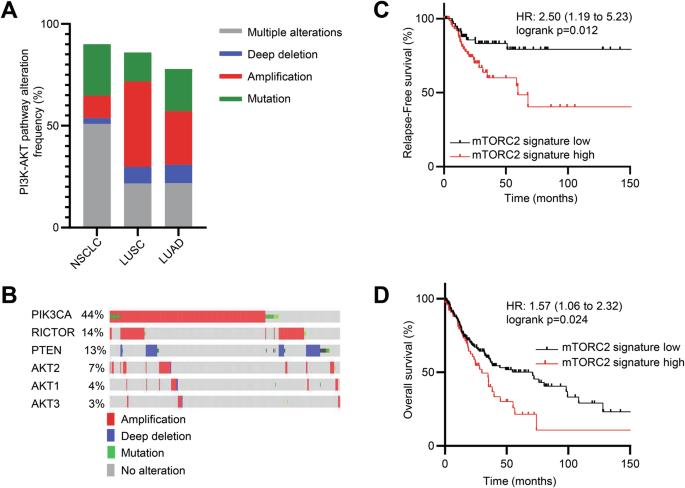靶向mTORC2治疗肺鳞状细胞癌可通过PSGL-1-VISTA轴提高抗肿瘤免疫。
IF 5
3区 医学
Q1 BIOTECHNOLOGY & APPLIED MICROBIOLOGY
引用次数: 0
摘要
靶向治疗提高了肺腺癌患者的生存率。然而,肺鳞癌(LUSC)缺乏类似的进展。免疫治疗的进展显示出一些希望,但LUSC的总体反应率仍然很低。在这里,我们证明mTORC2信号通路代表了LUSC中一个可操作的靶标,以改善抗肿瘤免疫反应。我们发现影响mTORC2通路的遗传改变在LUSC肿瘤患者中很常见,并且在小鼠模型中靶向mTORC2可降低LUSC肿瘤的生长。转录组学显示,mtorc2缺陷的LUSC细胞表现出糖酵解和缺氧相关基因的表达减少。与此一致的是,mTORC2信号的缺失会降低肿瘤间质液中的乳酸水平,从而降低肿瘤微环境中的酸度。有趣的是,mtorc2缺陷的LUSC细胞在HIF-2α依赖机制中也表现出ph敏感的VISTA配体PSGL-1的表达降低。在LUSC患者中,HIF-2α和PSGL-1的表达呈正相关,而在LUAD患者中则没有,这表明mTORC2、HIF-2α和LUSC免疫应答之间存在明显的关联。事实上,mTORC2功能缺失增强了肿瘤中CD8+ T细胞的活化,而使用抗vista免疫疗法仅在mTORC2信号完整的情况下才能减少LUSC肿瘤负荷。总的来说,这些数据描述了mTORC2信号在LUSC肿瘤中的重要作用,并证明了靶向mTORC2/PSGL-1/VISTA轴在对当前治疗无反应的患者中的治疗潜力。本文章由计算机程序翻译,如有差异,请以英文原文为准。

Targeting mTORC2 in lung squamous cell carcinoma improves anti-tumor immunity through the PSGL-1-VISTA axis
Targeted therapies have improved survival for lung adenocarcinoma patients. However, similar advances are lacking for lung squamous carcinoma (LUSC). Advances in immunotherapy have shown some promise, but the overall response rate remains low in LUSC. Here, we demonstrate that the mTORC2 signaling pathway represents an actionable target in LUSC to improve anti-tumor immune responses. We show that genetic alterations affecting the mTORC2 pathway are common among patients with LUSC tumors, and targeting mTORC2 reduces LUSC tumor growth in mouse models. Transcriptomics reveal that mTORC2-deficient LUSC cells exhibit reduced expression of glycolytic and hypoxia-related genes. In agreement, loss of mTORC2 signaling decreases lactate levels in tumor-interstitial fluid, creating reduced acidity within the tumor microenvironment. Interestingly, mTORC2-deficient LUSC cells also exhibited reduced expression of the pH-sensitive VISTA ligand PSGL-1 in a HIF-2α dependent mechanism. LUSC patients, but not those with LUAD, display a positive correlation in expression between HIF-2α and PSGL-1, suggesting a distinct association among mTORC2, HIF-2α, and immune responses in LUSC. Indeed, mTORC2 loss-of-function enhanced CD8+ T cell activation in tumors, while use of anti-VISTA immunotherapy reduced LUSC tumor burden only in the presence of intact mTORC2 signaling. Collectively, these data describe an important role of mTORC2 signaling in LUSC tumors and demonstrate the therapeutic potential of targeting the mTORC2/PSGL-1/VISTA axis in patients that are non-responsive to current therapies.
求助全文
通过发布文献求助,成功后即可免费获取论文全文。
去求助
来源期刊

Cancer gene therapy
医学-生物工程与应用微生物
CiteScore
10.20
自引率
0.00%
发文量
150
审稿时长
4-8 weeks
期刊介绍:
Cancer Gene Therapy is the essential gene and cellular therapy resource for cancer researchers and clinicians, keeping readers up to date with the latest developments in gene and cellular therapies for cancer. The journal publishes original laboratory and clinical research papers, case reports and review articles. Publication topics include RNAi approaches, drug resistance, hematopoietic progenitor cell gene transfer, cancer stem cells, cellular therapies, homologous recombination, ribozyme technology, antisense technology, tumor immunotherapy and tumor suppressors, translational research, cancer therapy, gene delivery systems (viral and non-viral), anti-gene therapy (antisense, siRNA & ribozymes), apoptosis; mechanisms and therapies, vaccine development, immunology and immunotherapy, DNA synthesis and repair.
Cancer Gene Therapy publishes the results of laboratory investigations, preclinical studies, and clinical trials in the field of gene transfer/gene therapy and cellular therapies as applied to cancer research. Types of articles published include original research articles; case reports; brief communications; review articles in the main fields of drug resistance/sensitivity, gene therapy, cellular therapy, tumor suppressor and anti-oncogene therapy, cytokine/tumor immunotherapy, etc.; industry perspectives; and letters to the editor.
 求助内容:
求助内容: 应助结果提醒方式:
应助结果提醒方式:


